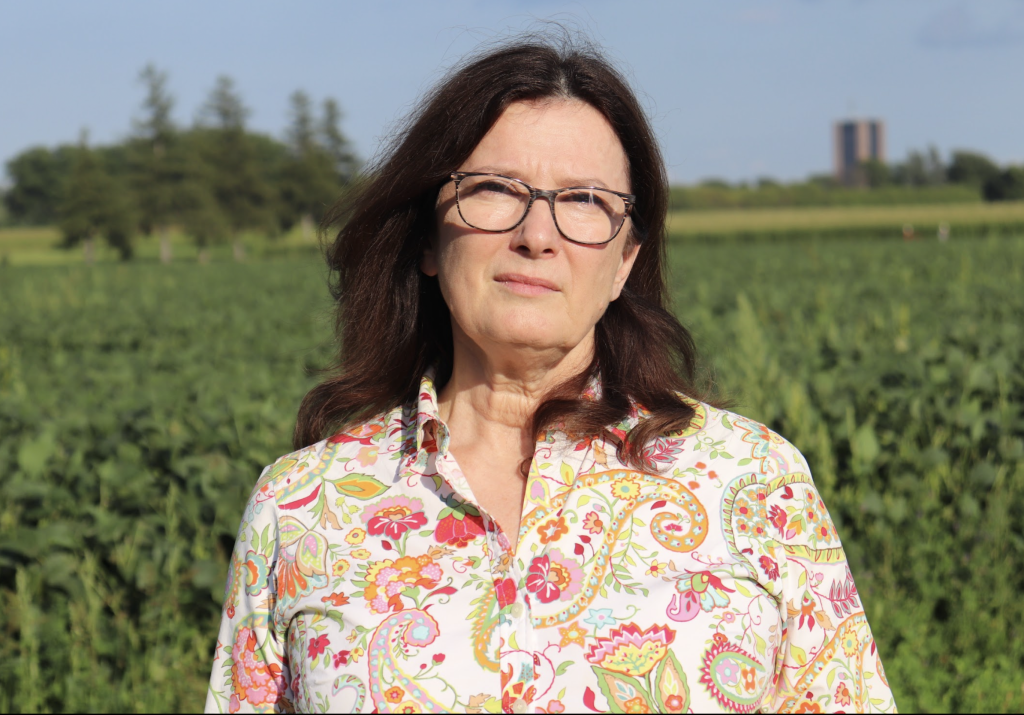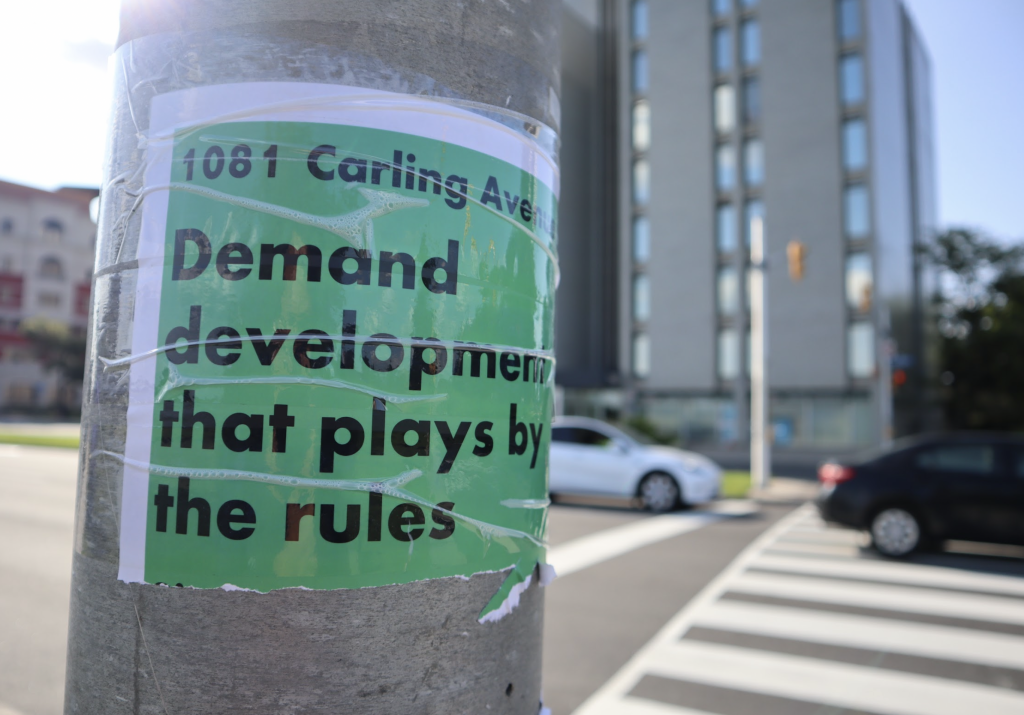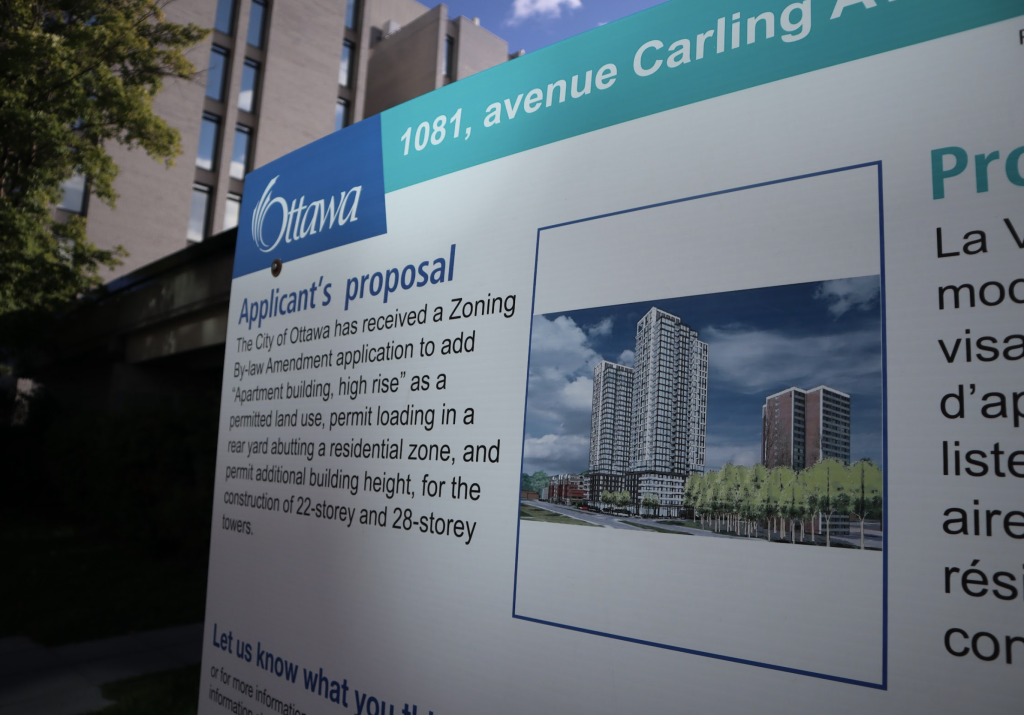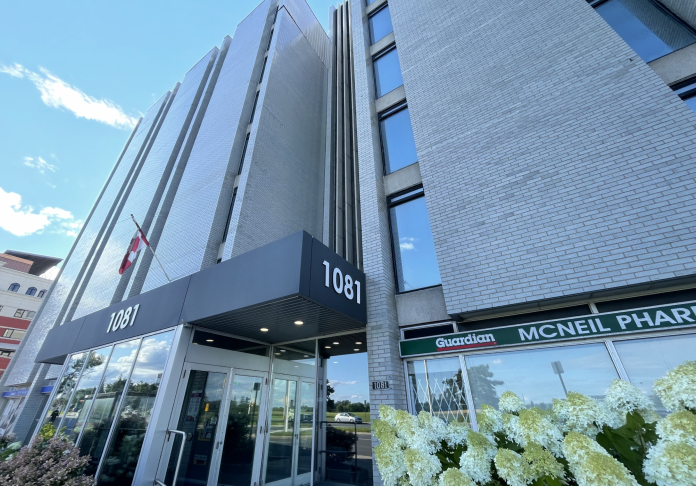By Charlie Senack
A controversial Carling redevelopment proposal will go back to the planning committee on Sept. 20 after two key agencies said they weren’t given proper notice ahead of time.
Taggart Realty Management is looking to build two towers at 1081 Carling Ave, where an eight-storey medical building currently stands. The proposed 16- and 27-storey residential units are aimed at helping Ottawa’s housing crisis, with 340 rental apartments as part of the plan.
While a large part of the community is in support of more housing coming to the site, there have been longtime concerns over the height of the two proposed buildings. The plans, which initially started with towers of 22 and 28 storeys, were submitted to the city twice and are now lower than originally planned.
At a recent virtual public consultation, over 160 residents attended the meeting. Pushback has now been heightened by fears it could impact research at the Central Experimental Farm located across the street.
In April, two key officials from Agriculture and Agri-Food Canada (AAFC) wrote a letter to the city, saying shadows from the buildings would cast deep into the farm toward sunset, therefore interfering with flowering and photosynthesis.
“The shadowing is a significant risk for AAFC as it impacts our research and jeopardizes our agricultural science and integrity,” part of the letter read. “AAFC has done an internal assessment of the proposed towers’ development and the impacts/risks to the CEF.”
A detailed study referenced in the letter said the roughly 28 hectares of land in question would lose about 70 days of sunlight per year. A greenhouse located near the Canadian Food Inspection Agency Building would also lose light because of the shadows.
The impacted fields grow special varieties of wheat, soybeans, barley, corn and oats. The research conducted helps scientists better understand the risks of climate change and the effects drought has on crops. It’s not easy to just move the crops elsewhere, say officials, due to varying soil compositions located around the 427 hectare farm.

Karen Wright, president of the Civic Hospital Neighbourhood Association, already had concerns over how the design of the towers would fit in with the neighborhood. After reading the letter penned by the AAFC, she’s also now concerned about the farm’s future.
“The Central Experimental Farm is two things: an important, long-term research facility for some important work… but it’s also a cultural heritage location,” Wright said in an interview with Kitchissippi Times. “Why would you take this jewel, this great city asset which is one of the city’s defining features of Ottawa, and destroy it?”
Wright said the size and location of farmland is almost the same as what was proposed for the new future Civic Hospital location. After much pushback, it was decided the new hospital would be built across from Dow’s Lake where the Sir John Carling building once stood.
On Aug. 16, the matter went before Ottawa’s planning committee and was approved 8-2 following a five-hour debate with 14 delegations. The green light also approved a zoning bylaw amendment to add highrise apartments as a permitted land use, while also allowing for additional building height. Current rules had a roughly nine-storey limit.
The news was disappointing but not surprising for Wright who felt more time should have been taken to address the farm’s concerns. River ward councillor Riley Brockington brought forward a motion asking for a two-month delay, giving time for more research to be conducted.
“I was disappointed in the micro decision-making that was going on. It was an opportunity for the councilors to step back and think about what is needed as a city and to meet their requirements to protect heritage properties like the Central Experimental Farm,” Wright said. “A short delay would not have slowed down this project one bit. It’s already been two years in the making and development isn’t expected for another five years.”

Kitchissippi ward councillor Jeff Leiper, who also chairs the city’s planning and housing and development committee, voted in favor of the development despite his community’s pushback. He said even if the height of the towers were reduced further, its shadows would still have a similar impact on the farm.
“I don’t consider that it’s unacceptable and I don’t consider that it’s going to inevitably lead to the loss of the farm, even as a research facility in Ottawa,” he told Kitchissippi Times. “The challenge for city council is that we don’t approve development, we approve rezoning. The lens through which we look when we consider approving rezoning is our official plan.”
Leiper said he suspected the matter was far from over as the Civic Hospital Neighbourhood Association or AAFC could file an appeal with the Ontario Land Tribunal.
The matter headed to city council on Aug. 23 for final approval, which was expected to be given. But then a surprising twist happened: it was revealed AAFC. alongside the National Capital Commission (NCC), did not receive proper notice of the planning committee meeting.
“To ensure the integrity of the process, City Council are being asked to pass a motion to have the item return to the Planning and Housing Committee along with the provision of a new Notice and publication of the staff report to ensure that proper notification takes place in accordance with the Planning Act,” wrote Don Herweyer, the city’s Interim General Manager of Planning.
During the Aug. 16 meeting, some councillors questioned why AAFC representatives were not at the table.
When the matter goes back to the planning committee, it will also include a revised Cultural Heritage Impact Statement which will provide an updated analysis on potential impacts the development could have on the farm.

